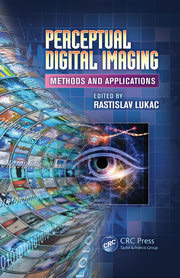|
A volume in the
Digital Imaging and Computer Vision series

Perceptual Digital Imaging:
Methods and
Applications
Edited by:
Rastislav Lukac
Foveon, Inc. / Sigma Corp., San Jose, California, USA
Boca Raton, FL, CRC Press / Taylor & Francis, October 2012
ISBN 978-1-4398-6856-0
Audience:
 |
Graduate and postgraduate students in the departments of
electrical engineering (specialization
digital imaging, image /video processing and analysis, computer vision,
pattern recognition), computer science, and applied mathematics. |
 |
Scientists and engineers working in
digital imaging, computer vision,
medical imaging, computer graphics, signal processing, and optical
engineering. |
|
|
Visual perception is a complex process
requiring interaction between the receptors in the eye that sense the
stimulus and the neural system and the brain that are responsible for
communicating and interpreting the sensed visual information. This
process involves several physical, neural, and cognitive phenomena whose
understanding is essential to design effective and computationally
efficient imaging solutions. Building on advances in computer vision,
image and video processing, neuroscience, and information engineering,
perceptual digital imaging greatly enhances the capabilities of
traditional imaging methods.
Filling a gap in the literature,
Perceptual Digital Imaging: Methods and Applications comprehensively
covers the system design, implementation, and application aspects of
this emerging specialized area. It gives readers a strong, fundamental
understanding of theory and methods, providing a foundation on which
solutions for many of the most interesting and challenging imaging
problems can be built.
The book features contributions by
renowned experts who present the state of the art and recent trends in
image acquisition, processing, storage, display, and visual quality
evaluation. They detail advances in the field and explore human visual
system-driven approaches across a broad spectrum of applications. These
include image quality and aesthetics assessment, digital camera imaging,
white balancing and color enhancement, thumbnail generation, image
restoration, super-resolution imaging, digital halftoning and dithering,
color feature extraction, semantic multimedia analysis and processing,
video shot characterization, image and video encryption, display quality
enhancement, and more.
This is a valuable resource for
readers who want to design and implement more effective solutions for
cutting-edge digital imaging, computer vision, and multimedia
applications. Suitable as a graduate-level textbook or stand-alone
reference for researchers and practitioners, it provides a unique
overview of an important and rapidly developing research field.
Features:
 |
Details recent advances in digital
imaging and human visual perception modeling |
 |
Explains the latest techniques,
algorithms, and solutions for image and video acquisition, processing,
analysis, and evaluation |
 |
Provides comprehensive coverage of
human visual system-driven computational imaging |
 |
Explores new digital image and video
processing applications |
 |
Contains numerous examples,
illustrations, color images, and tables summarizing results from
quantitative studies |
|
